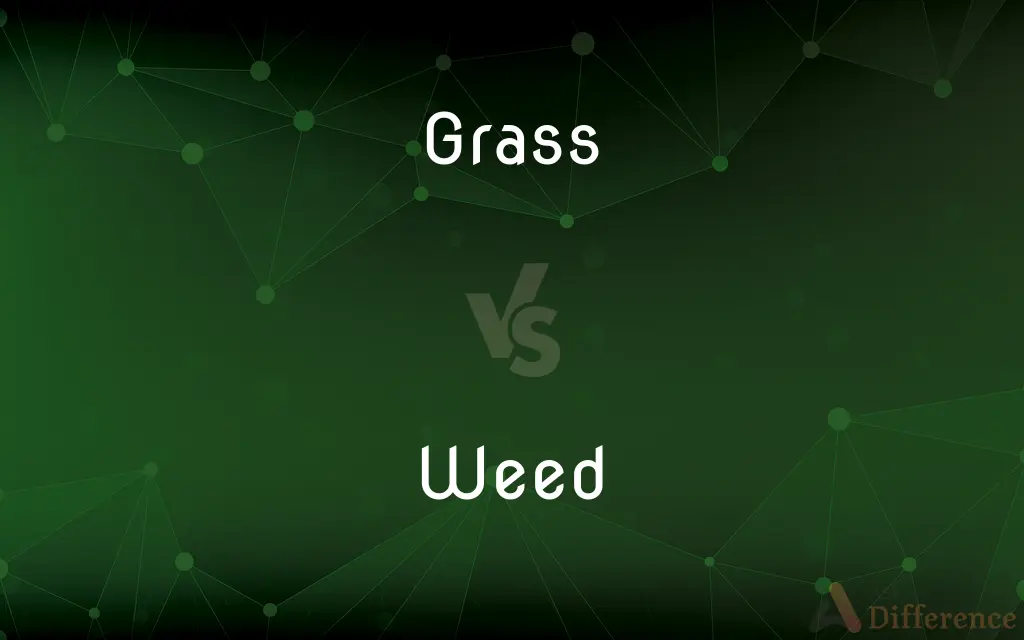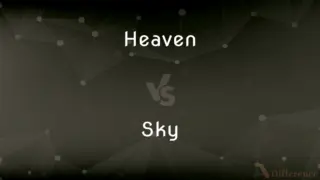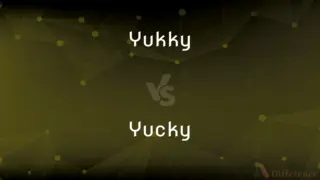Grass vs. Weed — What's the Difference?
By Tayyaba Rehman — Updated on September 19, 2023
Grass refers to green plants with jointed stems commonly covering ground areas, while weed generally denotes unwanted plants that grow where they aren't desired.

Difference Between Grass and Weed
Table of Contents
ADVERTISEMENT
Key Differences
Grass" and "weed" are terms related to plants, but they signify different types. Grass represents a family of plants with narrow leaves growing from the base. Many species of grass are used to cover lawns, sports fields, and pastures. On the contrary, the term "weed" is subjective and denotes plants considered undesirable in a particular setting.
Grass, in many cultures, has economic importance. It serves as a primary food source for livestock and is cultivated for lawns, ornamental use, and even certain sports. Different types of grasses, like Bermuda or Kentucky bluegrass, are specifically chosen for their resilience, appearance, or texture. Weed, however, often competes with cultivated plants for resources, potentially harming or reducing the yield of the desired crop or aesthetics of a garden.
One may be intrigued to know that some plants labeled as "weeds" in one region might be considered "grass" or even valued plants in another. It's all about context. A dandelion, for instance, could be a weed in a pristine lawn but might be valued for its medicinal properties elsewhere.
It's essential to recognize that the term "weed" doesn't classify a botanical category. It's a descriptor based on human judgment and context. Grass, however, does belong to a botanical family, and its characteristics are more fixed and universally recognized.
In summary, while grass has a more consistent definition across contexts, a weed's definition can vary based on location, culture, or individual preference. The distinction lies in the desired versus undesired nature of the plants in specific settings.
ADVERTISEMENT
Comparison Chart
Definition
A monocotyledonous plant with narrow leaves.
Any plant growing where it is not wanted.
Economic Importance
Used for lawns, feed, sports, etc.
Often removed due to competition with desired plants.
Perception
Generally favored and cultivated.
Often seen as pests or nuisances.
Botanical Classification
Belongs to the Poaceae family.
No fixed botanical category; varies by context.
Common Example
Kentucky bluegrass, Bermuda grass.
Dandelion, crabgrass (ironically, a type of grass!).
Compare with Definitions
Grass
Any plant of the family Poaceae.
Rice and wheat are types of grass used as food.
Weed
Any wild plant growing where it's not wanted.
His garden was full of weeds after neglecting it for months.
Grass
Slang: informer or spy.
He was suspected of being the grass that tipped off the police.
Weed
Something or someone considered useless or troublesome.
He's seen as the weed of the group.
Grass
Ground area covered with grass, like a lawn.
She sat down on the grass to enjoy her picnic.
Weed
A weed is a plant considered undesirable in a particular situation, "a plant in the wrong place". Examples commonly are plants unwanted in human-controlled settings, such as farm fields, gardens, lawns, and parks.
Grass
A member of the grass family.
Weed
A plant considered undesirable, unattractive, or troublesome, especially one that grows where it is not wanted and often grows or spreads fast or takes the place of desired plants.
Grass
The members of the grass family considered as a group.
Weed
An aquatic plant or alga, especially seaweed.
Grass
Any of various plants having slender leaves similar to those of a grass.
Weed
Something considered useless, detrimental, or worthless.
Grass
Ground, as on a lawn, that is covered with grass or similar plants.
Weed
Tobacco.
Grass
Grazing land; pasture.
Weed
A cigarette.
Grass
(Slang) Marijuana.
Weed
Marijuana.
Grass
(Electronics) Small variations in amplitude of an oscilloscope display caused by electrical noise.
Weed
A token of mourning, as a black band worn on a man's hat or sleeve.
Grass
Chiefly British Slang An informer.
Weed
Weeds The black mourning clothes of a widow.
Grass
To cover with grass.
Weed
Often weeds(Archaic) An article of clothing; a garment.
Grass
To grow grass on.
Weed
To clear of weeds
Weeded the flowerbeds.
Grass
To feed (livestock) with grass.
Weed
To remove (weeds). Often used with out
Weed out dandelions.
Grass
To become covered with grass.
Weed
To eliminate as unsuitable or unwanted. Often used with out
Weed out unqualified applicants.
Grass
To graze.
Weed
To remove weeds.
Grass
Any plant of the family Poaceae, characterized by leaves that arise from nodes in the stem and leaf bases that wrap around the stem, especially those grown as ground cover rather than for grain.
Weed
(countable) Any plant unwanted at the place where and at the time when it is growing.
If it isn't in a straight line or marked with a label, it's a weed.
Grass
(countable) Various plants not in family Poaceae that resemble grasses.
Weed
Underbrush; low shrubs.
Grass
(uncountable) A lawn.
Weed
A drug or the like made from the leaves of a plant.
Grass
Marijuana.
Weed
Cannabis.
Grass
An informer, police informer; one who betrays a group (of criminals, etc) to the authorities.
What just happened must remain secret. Don't be a grass.
Weed
Tobacco.
Grass
Sharp, closely spaced discontinuities in the trace of a cathode-ray tube, produced by random interference.
Weed
A cigar.
Grass
Noise on an A-scope or similar type of radar display.
Weed
(countable) A weak horse, which is therefore unfit to breed from.
Grass
The season of fresh grass; spring or summer.
Weed
A puny person; one who has little physical strength.
Grass
That which is transitory.
Weed
Something unprofitable or troublesome; anything useless.
Grass
Asparagus; "sparrowgrass".
Weed
(archaic) A garment or piece of clothing.
Grass
(mining) The surface of a mine.
Weed
(archaic) Clothing collectively; clothes, dress.
Grass
(transitive) To lay out on the grass; to knock down (an opponent etc.).
Weed
(archaic) An article of dress worn in token of grief; a mourning garment or badge.
He wore a weed on his hat.
Grass
To act as a grass or informer, to betray; to report on (criminals etc) to the authorities.
Thesaurus:rat out
Weed
(archaic) Especially in the plural as widow's weeds: (female) mourning apparel.
Grass
(transitive) To cover with grass or with turf.
Weed
(Scotland) A sudden illness or relapse, often attended with fever, which befalls those who are about to give birth, are giving birth, or have recently given birth or miscarried or aborted.
Grass
(transitive) To feed with grass.
Weed
(Scotland) Lymphangitis in a horse.
Grass
(transitive) To expose, as flax, on the grass for bleaching, etc.
Weed
To remove unwanted vegetation from a cultivated area.
I weeded my flower bed.
Grass
(transitive) To bring to the grass or ground; to land.
Weed
(figurative) To pilfer the best items from a collection.
Grass
Popularly: Herbage; the plants which constitute the food of cattle and other beasts; pasture.
Weed
(library science) To systematically remove materials from a library collection based on a set of criteria.
We usually weed romance novels that haven't circulated in over a year.
Grass
An endogenous plant having simple leaves, a stem generally jointed and tubular, the husks or glumes in pairs, and the seed single.
Weed
Simple past tense and past participle of wee
Grass
The season of fresh grass; spring.
Two years old next grass.
Weed
A garment; clothing; especially, an upper or outer garment.
He on his bed sat, the soft weeds he worePut off.
Grass
Metaphorically used for what is transitory.
Surely the people is grass.
Weed
An article of dress worn in token of grief; a mourning garment or badge; as, he wore a weed on his hat; especially, in the plural, mourning garb, as of a woman; as, a widow's weeds.
In a mourning weed, with ashes upon her head, and tears abundantly flowing.
Grass
Marijuana.
Weed
A sudden illness or relapse, often attended with fever, which attacks women in childbed.
Grass
To cover with grass or with turf.
Weed
Underbrush; low shrubs.
One rushing forth out of the thickest weed.
A wild and wanton pard . . . Crouched fawning in the weed.
Grass
To expose, as flax, on the grass for bleaching, etc.
Weed
Any plant growing in cultivated ground to the injury of the crop or desired vegetation, or to the disfigurement of the place; an unsightly, useless, or injurious plant.
Too much manuring filled that field with weeds.
Grass
To bring to the grass or ground; to land; as, to grass a fish.
Weed
Fig.: Something unprofitable or troublesome; anything useless.
Grass
To produce grass.
Weed
An animal unfit to breed from.
Grass
Narrow-leaved green herbage: grown as lawns; used as pasture for grazing animals; cut and dried as hay
Weed
Tobacco, or a cigar.
Grass
German writer of novels and poetry and plays (born 1927)
Weed
To free from noxious plants; to clear of weeds; as, to weed corn or onions; to weed a garden.
Grass
Animal food for browsing or grazing
Weed
To take away, as noxious plants; to remove, as something hurtful; to extirpate; - commonly used with out; as, to weed out inefficiency from an enterprise.
Wise fathers . . . weeding from their children ill things.
Revenge is a kind of wild justice, which the more man's nature runs to, the more ought law to weed it out.
Grass
Street names for marijuana
Weed
To free from anything hurtful or offensive.
He weeded the kingdom of such as were devoted to Elaiana.
Grass
Shoot down, of birds
Weed
To reject as unfit for breeding purposes.
Grass
Cover with grass;
The owners decided to grass their property
Weed
Any plant that crowds out cultivated plants
Grass
Spread out clothes on the grass to let it dry and bleach
Weed
Street names for marijuana
Grass
Cover with grass
Weed
Clear of weeds;
Weed the garden
Grass
Feed with grass
Weed
A plant considered undesirable in a particular situation.
She spent the morning pulling weeds from the garden.
Grass
Give away information about somebody;
He told on his classmate who had cheated on the exam
Weed
Slang: marijuana.
Some states have legalized the recreational use of weed.
Grass
Green plants with jointed stems, forming ground cover.
The grass in our backyard feels soft underfoot.
Grass
A ground cover made up of such plants.
Children love to play on the grass during summer.
Common Curiosities
Is bamboo a type of grass?
Yes, bamboo is technically a type of grass.
Can grass be invasive?
Yes, some grasses can become invasive and outcompete native species.
Do weeds have any benefits?
Some do, for soil health, pollinators, or even human consumption.
Is it easy to get rid of weeds?
It varies; some are persistent and require multiple removal methods.
Are all weeds harmful?
No, some are beneficial for biodiversity or even have medicinal properties.
Why are weeds undesirable?
They can compete with desired plants for resources or disrupt aesthetics.
Can weeds be beautiful?
Beauty is subjective. Some people find certain weeds, like wildflowers, quite attractive.
Is all grass beneficial?
Not always. Some grass types, like crabgrass, are often considered weeds in lawns.
Can a plant be both grass and weed?
Yes, if it's from the grass family but grows undesirably, like crabgrass.
How can I differentiate grass from other plants?
Grass typically has jointed stems, long narrow leaves, and fibrous roots.
Are all weeds wild plants?
Not necessarily. Even cultivated plants can become weeds if they grow where they aren't wanted.
Do some people intentionally grow weeds?
Yes, some "weeds" have culinary or medicinal value.
How do grasses reproduce?
Most grasses reproduce through seeds, but some can also spread via underground stems.
Why are some grasses used in sports fields?
They can tolerate heavy traffic and provide a smooth playing surface.
Are there natural ways to control weeds?
Yes, like mulching, hand-pulling, or using specific plant or insect species to deter them.
Share Your Discovery

Previous Comparison
Heaven vs. Sky
Next Comparison
Yukky vs. YuckyAuthor Spotlight
Written by
Tayyaba RehmanTayyaba Rehman is a distinguished writer, currently serving as a primary contributor to askdifference.com. As a researcher in semantics and etymology, Tayyaba's passion for the complexity of languages and their distinctions has found a perfect home on the platform. Tayyaba delves into the intricacies of language, distinguishing between commonly confused words and phrases, thereby providing clarity for readers worldwide.














































